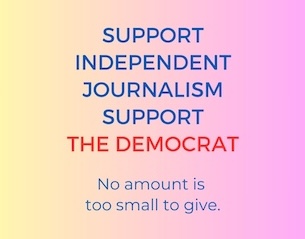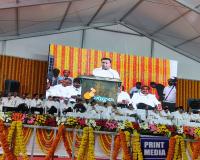- More
- 7th Day at #MediaNext 2020: Digital writing cannot take away the soul of storytelling
7th Day at #MediaNext 2020: Digital writing cannot take away the soul of storytelling
By Moumita De Das Writing in Digital Times may have put up challenges to espouse technology in nouveau style among the authors but they agreed that the art of storytelling will continue to cater readers in the same manner On 7th day of #MediaNext 2020 was a confluence of five eminent authors who spoke on

By Moumita De Das
Writing in Digital Times may have put up challenges to espouse technology in nouveau style among the authors but they agreed that the art of storytelling will continue to cater readers in the same manner
On 7th day of #MediaNext 2020 was a confluence of five eminent authors who spoke on the traditional mode of storytelling and challenges of digital media. The issues highlighted on this day were mythology, relationships, gender, feminism, sexuality, parenting, single women and co-existence of traditional books and e-books. They share their insight with the young budding writers and students that only reading and open minds can expand their horizon to reach their goals in the world of words.
Adamas University, Kolkata is hosting this digital conclave – #MediaNext 2020, which is a series of webinars with industry stalwarts from various domains spread over 10 days, starting June 1 to 10.
The topic of today’s discussion was “Writing in Digital Times: Fiction and Non-fiction” it was moderated by Pro Vice Chancellor of Adamas University, Prof. Ujjwal K Chowdhury.
The first speaker of the session was Rajesh Iyer, Storyteller, who shared his insight on the core of storytelling with 5 Es. The first was “Emotion”, which he defined as the emotional connection with the audience. Second was “Earthiness” that spoke about the non-plastic sense of a story which has more raw essence to it. Third was “Earnestness”, which a writer must include in his/her writing. Fourth was “Empathy”, where the audience should empathise with the story. Fifth was “Engagement”, which he designated to be ‘the’ most important thing for writing in digital times as it needs to be interactive and not top down.
Iyer further added a coinage of two different words as “Going Local” as a mantra to stand out. He said, “Local means the Local feel and the Global reach”, which would eventually be the core of storytelling in digital age. He used the signature tagline of Amar Chitra Katha, “Route to your roots”, where he explained the three ‘tentpoles’ – Social, Cultural and Spiritual. He also spoke about the dangers of ‘The single-story syndrome’ and said, “Every story should have multiple narrators which makes it livelier.” He elucidated that the Indian medieval writers had an excellent usage of Nava Rasa like that of ‘Mahabharata’. His selection of themes depend on the core of his heart whether he feels an inner kick to it. Answering to a question on the varied narratives of Draupadi he said, “There have been so many narratives of Draupadi like male or female perspectives but her spiritual aspect was never explored though she was a close acquaintance of Lord Krishna.” Finally he signed off by saying, “Epics are still alive in the East because we reinvent it but West did not reinvent their epics.”
Jaseena Backer, Psychologist, Parenting Consultant and Writer of ‘Tales that Entail’ was our second speaker who shared her three I s to connect to the readers. Backer said, “There are three Is namely, Intense writing, Interest in audience and Impact your audience. All three combined qualities are essential to ensure ‘I’ as a writer has responsibility to fulfil these virtues.” She stressed on an egalitarian approach in every relationship which sustains in the long run. She further added, “Gender is not a see-saw and Feminism entails only equality.”
Backer shared her parenting journey and challenges of a single motherhood through ‘Mahek & Me’, a series on Facebook. She also spoke in length about her love for saree and her digital platform ‘Saree In Style’ which have 12000 women. This platform is celebrating a ‘Body Positivity Week’ to shun inhibitions about looks among women folks. She even shared her parenting tips and said that there is a dearth of parenting psychologists in the country. Lastly, she mesmerised her audience by reading a short story from her book, ‘Tales that Entail’.
Acclaimed journalist and best-selling Indian author Sreemoyee Piu Kundu was our third speaker who shared her journey from being a naive college student to a journalist and now a well known author. She started with her first book ‘Faraway Music’ then to ‘Sita’s Curse’ which changed her life. She became the first woman English writer in India to write about female erotica. She said, “There had been earlier writings on women sexuality and issues of ‘consent of sexuality’ like of Ismat Chugtai but not a full-fledged erotica.”
Sreemoyee spoke in details about her only non-fiction book, ‘Status Single’ which now became an active platform for women empowerment. She expressed her concern on gender issues and said, “Gender should have inclusiveness and Feminism should be equal to human rights but unfortunately these were reduced to tokenism by the corporate. So we have to fathom that gender perspectives depends lot on our conditions like socio-economic, moral or religious etc.” Finally, she suggested the budding writers and students to read books especially regional language writers which would enhance their social conditioning to become rich in literature.
Saira Shah Halim the fourth speaker of the day is a Political Analyst, an Educator, a Social and peace Activist and a theatre personality. Saira said, “Reading actually takes us to an uncharted flight. I believe, writing has no end, it floats like a sea.” She further added, writing is the way to reach out to people, express emotions, protest against violence, entertainment everything begins from writing. During lockdown, the time is so unreal that people were finding solace in writing through different digital platforms as well as traditional modes. In the last three months, people had been writing and reading a lot according to different services. Writing poems, short stories, articles, making a blog, new websites this was how people utilized their quarantine.
Saira ended up her discussion by a suggestion for the audience, “Be positive and enjoy the different platforms which may open various avenues like e-commerce, e-reading, e-learning and continue reading varied genres to unlock your potential.”
Our final speaker of the day was famous Bengali novelist, Sangeeta Bandyopadhyay, who began the session with a comparative study of George Orwell and Aldous Huxley in context of the pandemic times. She then shared her journey as a newspaper columnist before digital era. How her novel on women sexuality, ‘Panty’, published by the Ananda Publishers in 2006 was a class-apart decision by the publisher to publish in those times. She shared her theory of ‘Magic Realism’ in writing and gave examples of the works of Gabriel Gracia Marquez and Kafka. Till date three of her works had been published she said, “Language is not a barrier if the content appeals and in tunes with the social aspects then world is for writers.” She stated that having an in depth knowledge is necessary to be a writer like reading others works, study of history and knowing one’s own society. On asking about her upcoming projects she shared her way of plotting themes and criteria she considered while writing. She suggested students to read ‘History of reading’ by Alberto Manguel, a book with emotions of book reading. She also shared that ‘Desh’ a popular Bengali fortnightly magazine of Anandabazar Publications became digital recently. She shared concerns about the uncertainty of the print media but is hopeful of the future that both digital and print will survive simultaneously. She signed off by saying, “Media will be digitised in future but print will not die for sure. The future of digital story telling will be a culmination of audio, video, text and cartoon.”
The focus of the MediaNext 2020 webinar series revolves around the impact of the COVID-19 pandemic on the media and entertainment industry. This digital conclave is being organised in association with Sharda University, Birla Global University, DME, AIMEC, Lok Samvad Sansthan, exchange4media and IndiaReal.in and it is being hosted by the School of Media, Communication & Fashion (SMCF), Adamas University.
ooo











